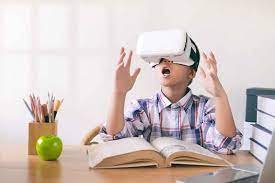In recent years, virtual reality (VR) has emerged as a groundbreaking technology with the potential to transform various industries. Among these, the field of education stands to benefit immensely from the immersive and interactive experiences offered by VR. By creating realistic virtual environments and simulations, virtual reality has the power to revolutionize the way we teach and learn. In this article, we will explore the impact of virtual reality on education and delve into the benefits it brings to students and educators alike.
Enhanced Learning Experiences
Virtual reality provides a unique opportunity to create engaging and immersive learning experiences that go beyond traditional classroom settings. By leveraging VR headsets and controllers, students can explore virtual worlds, visit historical sites, travel to distant planets, or even witness complex scientific experiments firsthand. This hands-on approach fosters curiosity, deepens understanding, and sparks a love for learning in students.
Improved Retention and Comprehension
Research suggests that experiential learning leads to better retention and comprehension of information. VR-based educational experiences allow students to actively participate, interact with objects, and make decisions in simulated scenarios. This active engagement enhances memory retention and enables learners to grasp complex concepts more effectively. By immersing students in a virtual environment tailored to their educational needs, VR bridges the gap between theoretical knowledge and practical application.
Access to Remote Learning Opportunities
One of the most significant advantages of VR in education is its ability to transcend geographical boundaries. Virtual reality enables students to access educational content and experiences that may not be feasible in their physical surroundings. Through VR, learners can visit museums, archaeological sites, or attend lectures by renowned experts from around the world without leaving their classrooms. This democratization of education opens up endless possibilities for students, regardless of their location or socioeconomic background.
Enhanced Collaboration and Communication
Virtual reality also promotes collaborative learning by enabling students to interact with each other in shared virtual spaces. Whether they are working on group projects or participating in virtual classrooms, students can collaborate and communicate in real-time, fostering teamwork and problem-solving skills. Moreover, educators can guide and support students within the virtual environment, providing instant feedback and personalized instruction.

Empathy and Cultural Understanding
Virtual reality has the remarkable ability to cultivate empathy and cultural understanding by enabling users to step into the shoes of others. Through VR simulations, students can experience different perspectives, cultures, and historical events. This immersive experience fosters empathy, tolerance, and a deeper appreciation for diversity. By broadening their horizons, virtual reality prepares students to be global citizens in an increasingly interconnected world.
Challenges and Future Prospects
While the potential of virtual reality in education is vast, there are challenges to be addressed. Cost, accessibility, and technological limitations need to be overcome to ensure widespread adoption. However, as VR technology continues to advance and become more affordable, these barriers are gradually being reduced.
Looking ahead, the future of virtual reality in education appears promising. As the technology becomes more integrated into the curriculum, teachers will have access to an array of educational content and tools, empowering them to deliver dynamic and personalized instruction. Furthermore, advancements in augmented reality (AR) and mixed reality (MR) will likely enhance the educational experience even further, blending virtual elements with the physical world.
Conclusion
Virtual reality is transforming education by redefining the way we learn and teach. By creating immersive and interactive environments, VR enhances learning experiences, improves retention, and provides access to remote educational opportunities. Moreover, it fosters collaboration, empathy, and cultural understanding. While challenges exist, the potential of virtual reality in education is undeniable. With continued advancements, VR holds the promise to revolutionize education and empower learners to thrive in a rapidly evolving world.


